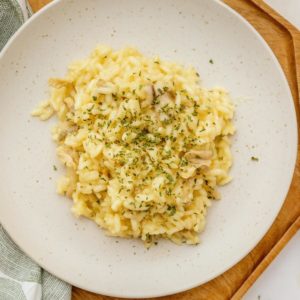This creamy rice dish has a nice hint of a meaty flavor from the mushrooms.

You can’t go wrong with mushrooms. They’re fat-free, low-sodium, low-calorie, and cholesterol-free. They’re also packed with fiber, vitamins, and minerals. The nutritional benefits, though, will vary depending on the type of mushroom you choose.
Mushrooms bring a savory flavor to meals without adding much fat, calories or sodium. But the health benefits don’t stop there. Researchers continue to uncover how eating mushrooms can ward off chronic disease and improve your everyday health.

Mushrooms Instead of Meat
Earthy and savory, mushrooms are an incredibly versatile ingredient. Mushroom varieties like shiitake, King oyster (or smaller oyster mushrooms), and portobello are full of hearty, earthy flavors that do wonders in so many dishes, especially as a protein-rich meat substitute for vegetarian and vegan diets.
Without a doubt, mushrooms are a good meat substitute, especially for a diabetes diet to control your blood glucose levels. These little miracles surpass meat in many ways and, best yet, they can be comparable in “meatiness” as a base for many dishes.
Why are Mushrooms Good for You?
Mushrooms are a very healthy food and could have medicinal properties, because they are good sources of protein, B-vitamins, fiber, immune-enhancing sugars found in the cell walls called beta-glucans, and other bioactive compounds. Mushrooms have been used as food and sometimes as medicine.
Mushrooms contain macronutrients that support a healthy immune system. According to the Mushroom Council, your immune system will benefit from mushrooms whose nutrients include:
Selenium, which helps your body make antioxidant enzymes to prevent cell damage. Choose cremini or portabella mushrooms for the most benefit.
Vitamin D, which assists with cell growth, boosts immune function and reduces inflammation. Maitake mushrooms offer an easy way to add vitamin D to your diet.
Vitamin B6, which helps your body form red blood cells, proteins and DNA. Shiitake mushrooms are the best choice for vitamin B6.
Due to their exposure to UV rays or sunlight, mushrooms are a natural, non-animal source of vitamin D2 that’s capable of increasing blood levels of this vitamin as effectively as a supplement — and white mushrooms are no exception. Your body turns vitamin D2 into the active form of vitamin D, which it needs to absorb calcium and keep your bones healthy.

Is Risotto Really Rice?
Risotto is a creamy rice dish made with a type of rice called Arborio. The superfino rice variety comes from the Arborio region of Italy and is known to contain higher levels of starch. Risotto can be a side dish, but it is also often consumed as a complete meal when vegetables are added.
Is Risotto Healthy?
Packed with Vitamin A and C, arborio rice is a healthy boost of nutrients. One cup of arborio or risotto rice contains about 100 to 110 grams of carbohydrate to very little fat, the perfect amount to help you build muscle and stay insulin sensitive. So is risotto good for diabetics? Yes! But it's a great food for more than just managing diabetes and improving blood sugar control.
Protein is essential for many essential functions, and arborio rice gives you exactly what you need. It contains about 9 grams of protein per serving. And, since proteins are involved in just about every body function, it’s vital that you simply consume foods that contains protein. In fact, it is especially important to help your body repair cells and make new ones.
Arborio rice is starchier than most other types of rice, which gives it a creamy texture when cooked, but allows it to retain an "al dente" slight crunch in each grain. Although Arborio rice is originally a whole grain, most commercially sold varieties are refined white rice, which have less dietary fiber and fewer overall nutrients.

Buying and Storage Tips
When choosing your mushrooms, make sure they feel firm, aren’t moist to the touch, and are mold-free. Brush the dirt off and rinse them lightly when you’re ready to use them.
Mushrooms should be refrigerated until use, but ideally consumed within one week. Do not wash or clean them until just before using. Storing in a brown paper bag with the top open will help to absorb moisture and keep them from spoiling, as opposed to tight plastic wrapping that traps moisture. Because they are about 80-90% water, mushrooms do not freeze well, becoming mushy when defrosted.
When shopping for risotto rice, the best option will depend a lot on personal preference. You may find that you enjoy a particular brand or a specific combination of types of rice. The best rice for risotto is Arborio rice, as it is one the one most commonly used in the dish.
To store uncooked risotto rice, keep it in a cool, dry area and store it in a sealed, airtight container or inside a heavy-duty freezer bag. You can also put your sealed container or freezer bag in the refrigerator or freezer.


Creamy Mushroom Risotto
Ingredients
- 2 cups oyster mushrooms - or your favorite kind
- 1/3 cup shallot - chopped finely
- 1/4 cup low-sodium vegetable broth
- 2/3 cup dry white wine - or cooking white wine
- 1 3/4 cup Arborio rice (risotto)
- 6 cups low-sodium broth
- 1/3 cup vegan parmesan - grated or shredded
- salt - optional
- 2 tbsp parsley - chopped
Instructions
- Sauté the mushrooms and shallots in vegetable broth in medium-high heat for 5 minutes.
- Add wine and simmer until reduced by half.
- Add the rice and sauté until rice starts to become golden, about 3 minutes.
- Slowly add broth, 1/4 of a cup at a time. Stir continually until the liquid is absorbed. Continue until all the liquid is used up and the rice mixture is creamy. This may take a while but continue stirring.
- Add the vegan parmesan and mix well. Add the parsley and salt if using.
- Serve immediately.

